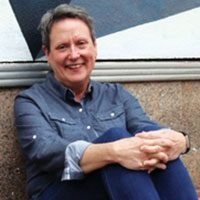A few weeks ago, 60 Minutes aired a segment on the plight of honey bees. Rarely do things bother me on television or in movies but the journalistic content of this story stayed with me, disturbing my psyche and my sleep. Recently, the fact that honeybees are not returning to their hives has been brought to my attention over and over again and I am unsettled by this coincidental chain of events and the subliminal message. 
The dominoes started falling in the North Carolina mountains. A small sign mounted on the side of a telephone pole simply read “Honey for Sale” with a small black and yellow bumble bee painted beside the verbiage. My husband Mac and I turned into a farm’s earthen driveway and parked beside an aging garage workshop. We met the Kirsteins, a charming older couple with four dogs, and bought a jar of wildflower honey from them. It has been a divine additive to our hot tea.
During our visit, Ray Kirstein explained that his bees aren’t coming back. Mac and I had been familiar with this situation from news stories but here we were talking to a real, live beekeeper. Ray told us he wasn’t sure why the bees weren’t coming home but maybe it had something to do with cell phones, radio towers or air waves filtering through the atmosphere from orbiting satellites. Whatever the case, Ray’s honey inventory was low, confined to a single shelf in the garage under a heating lamp.
I hadn’t given the bees much thought again until I watched Steve Croft interview a commercial beekeeper who has seen a 70% reduction in his bee business in what is characterized as “colony collapse disorder.” He has had to import bees from Australia to keep his U.S. agricultural customers producing “as an estimated one-third of US honeybees have disappeared in the last year.” As 60 Minutes ended, my husband flipped to the PBS station and there was that same beekeeper, on an entirely different program, reiterating the honeybee dilemma.
The next morning, as I spoke to a computer tech at my company’s help desk about problems with my email and internet connection, I mentioned the TV magazine story, my discomfort over the honeybees and my resulting lack of sleep. “You know what Einstein is reported to have said, don’t you?” the far off voice asked as he took control of my desktop. Well no, I didn’t. “He said something about the health of the bees being an indicator of the lifespan of our civilization.” I was stunned. I didn’t know anything about Einstein and the bees. Why would a man of his genius be thinking about bees? Why was I obsessed with bees?
I Googled “Einstein and Bees” on the worldwide web, and sure enough, there is quite a “buzz” attributing the following quote to Albert: “If the bee disappeared off the surface of the globe, then man would only have four years of life left."
Later that same day, the Comcast classical music station played “Flight of the Bumblebee” by Rimsky-Korsakov. The infamous, fast-paced concert piece with violins screaming a frantic melody emulates the sound of bees humming around an active hive. This orchestral composition gave me the feeling I was entering a frenetic episode of the Twilight Zone or listening to the soundtrack of an Alfred Hitchcock movie.
My crescendo came on a Sunday evening at the Plaza Theater as I watched “Bee Movie” with my mom and a bunch other Beaufort moms, dads and kids. Barry B. Benson, Jerry Seinfeld’s alter ego in the form of a bee on a mission, spearheads a campaign that shuts down commercial honey operations resulting in the slow death of the trees and flowers of Central Park – an animated representation of our future if bees go away. Barry realizes the importance of the honey industry to plants, animals and the human race and air freights thousands of pollen-rich flowers (the only live flowers left in the country) back to NYC and away from Rose Bowl parade floats. This feat saves the day and Barry, the bees, his human girlfriend and the audience returns to our merry way comfortable in the continued coexistence of bees and man.
My fixation with the honeybee culminated in my observations of the packaging that contained my cheeseburger Happy Meal from McDonald’s. Even though my toy surprise was Wally the Waterbug and not Barry or his best friend Adam, I learned some fun facts about bees from the little container that held my burger and fries. Honeybees travel at 12 mph, live in hives with 60-80,000 other bees and must visit 2,000,000 flowers to make one pound of honey. Did you know that? Does that mean that our friend on 60 Minutes who is losing 70% of his bees loses 42-56,000 bees per hive, if they come back at all? And what about the flowers? If millions of flowers aren’t pollinated, millions of flowers die off. It’s the vicious cycle of life.
I haven’t been a diligent environmentalist. I haven’t seen “An Inconvenient Truth” and I don’t recycle. I do pick up trash when I see it lying around and I donate money to Friends of the Rivers and the Coastal Conservation League but that’s easy. Even though I can’t do anything to stem the flow of cell phone airwaves or discover a cure for an AIDS type virus that may be infecting the honeybee population, I must become a more diligent steward of my immediate environment. Almost everyday, I listen to another ecological saga reported on NPR and quietly, in an almost subtle attack, it seems that we are employing an environmental terrorism against ourselves.
This Thanksgiving season gives me pause to be grateful for the clean air and healthy waterways of our Lowcountry, and I believe our community is working to sustain our natural resources. I love the small joy of a warm cup of tea sweetened by wildflower honey and the fruits and vegetables that grace my kitchen table. In a recent documentary on the Salton Sea presented by the Arts Council of Beaufort County as part of the Southern Circuit Film Festival, the late Senator Sonny Bono is characterized as a “reborn environmentalist” in his quest to aid in restoring the man-made lake in southern California to a healthy state. Maybe I need to be “born again” to the needs of my environment and accept the bee as my small personal savior, whose humble beginnings in a lowly hive hold the answers to our ecological salvation.
Beeing Aware





